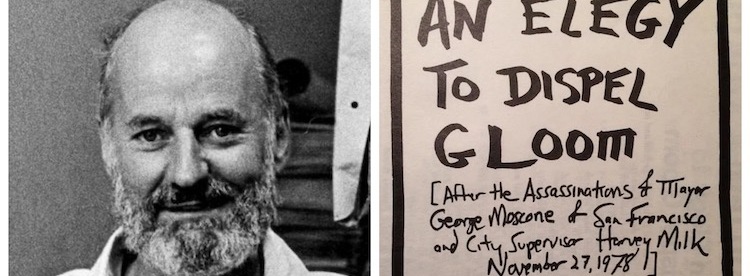 «“OCCHI, SOGNI, LABBRA, E LA NOTTE TRASCORRE…” – Ezra Pound, Campagna italiana
«“OCCHI, SOGNI, LABBRA, E LA NOTTE TRASCORRE…” – Ezra Pound, Campagna italiana
Occhi, sogni, labbra – e le parole li intrappolano se li lasciamo esposti alla lingua impietosa della mente Che altro dire fare se non cantare Sì! Sì! E lasciare che la pura estasi sia sovrana». (Lawrence Ferlinghetti, da Scoppi urla risate, trad. it. di Damiano Abeni, SUR, Roma 2019, p. 72).
La scomparsa di un poeta forse può essere ricordata con una poesia che testimoni una parola senza presa fissa sul reale, che può solo sfiorare, come una carezza. Scomparsa di chi sa la scomparsa, estasi di un io che si scompone “oltre il paesaggio”, come in Zanzotto.
Lawrence Ferlinghetti è morto il 22 febbraio a 101 anni. Una vita di passaggio tra lingue, culture, arte e sessualità, come scrittore, poeta, editore e libraio. Nato a Yonkers e madrelingua francese, emigrato con la zia a New York a cinque anni, Ferlinghetti è stato un assimilatore e rielaboratore attento, un costruttore di ponti, diremmo oggi.
Animatore della vita culturale di San Francisco fin dal dopoguerra, con la sua “City Lights”, la prima libreria americana ad avere una sezione di libri per gay e lesbiche, Ferlinghetti espande tutta la gioia di un’esistenza guidata da letture appassionate e da scorribande anarco-estatiche nel suo recente libro autobiografico Little Boy, edito in Italia da Clichy nel 2019. Alla libreria “City Lights”, fra l’altro, Bukowski ha presentato per la prima volta il suo Erections, Eiaculations, Exhibitions and General Tales of Ordinary Madness (il titolo italiano, Storie di ordinaria follia, sarà banalmente incompleto).
Altro luogo importante è il capanno di Ferlinghetti a Big Sur, luogo californiano dove Jack Kerouac si rifugia dopo aver scritto On the Road. Kerouac traccerà un memorabile quadro della comunità di meditanti ed estatici che si muove accanto al capanno nel romanzo Big Sur (1962). Sono cosa nota, inoltre, sempre sul lato beat generation, l’arresto e il processo per oscenità subiti da Ferlinghetti per aver pubblicato Howl and Other Poems di Allen Ginsberg (1956).
Meno noto, almeno in Italia, è il poema scritto da Ferlinghetti dopo l’assassinio di Harvey Milk, ovvero An Elegy to Dispel Gloom. After the Assassinations of Mayor George Moscone of San Francisco and City Supervisor Harvey Milk November 27, 1978, che riportiamo qui integralmente, a testimonianza di un impegno non solo letterario:
Let us not sit upon the ground
and tell sad stories
of the death of sanity.
Two humans made of flesh
are meshed in death
and no more need be said.
It is pure vanity
to think that all humanity
be bathed in red
because one young mad man
one so bad man
lost his head.
The force that through the red fuze
drove the bullet
does not drive everyone
through the City of Saint Francis
where there’s a breathless hush
in the air today
a hush at City Hall
and a hush at the Hall of Justice
a hush in Saint Francis Wood
where no bird tries to sing
a hush on the Great Highway
and in the great harbor
upon the great ships
and on the Embarcadero
from the Mission Rock
to the Eagle Cafe
a hush on the great red bridge
a hush in the Outer Mission
and at Hunter’s Point
a hush at a hot potato stand on Pier 39
and a hush at the People’s Temple
tries its wings
a hush and a weeping
at the Convent of the Sacred Heart
on Upper Broadway
a hush upon the fleshpots
of Lower Broadway
a pall upon the punk rock
at Mabuhay Gardens
and upon the cafes and bookstores
of old North Beach
a hush upon the landscape
of the still wild West
where two sweet dudes are dead
and no more need be said.
Do not sit upon the ground and speak
of other senseless murderings
or worse disasters waiting
in the wings.
Do not sit upon the ground and talk
of the death of things beyond
these sad sad happenings.
Such men as these do rise above
our worst imaginings.






